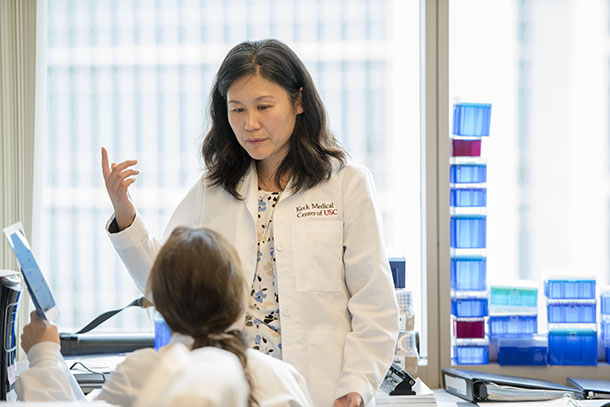In her new lab, Min Yu observed the eerie predictability of a line of human breast cancer cells. First in one mouse, then in many, the cells metastasized again and again to the same vital organ: the brain.
Alarmed, Yu telephoned the oncologist who had collected the cells from a patient. Yu learned that the patient had already succumbed to brain metastasis.
Yu’s strong combination of curiosity and compassion has inspired an intensely personal scientific journey.
Yu was born and raised on China’s northeastern coast in the city of Qingdao, famous for its beer. She was a curious child, with a strong interest in computer science as well as many other subjects. Ultimately, she chose to follow her mother’s example and become a physician.
Yu earned her MD at Shandong Medical University and her master’s degree in neurology at Peking University Health Science Center. Working in the neurology field, Yu saw many patients who had inherited diseases with no cures. It was heartbreaking for her to run up against the limitations of current medical practice — so she decided to devote herself to discovering new treatments as scientific researcher.
Yu left her home country and ventured to the United States, where she joined the PhD program at SUNY Stony Brook University/ Cold Spring Harbor Laboratory and turned her attention to breast cancer, which affects one in eight women and leads to 40,000 deaths annually.
“The lab was creating what we call 3-D cell cultures, which are systems to grow mammary cells in the laboratory,” she said. “These small structures resemble actual mammalian mammary glands that even secrete milk. And then if you introduce cancer genes, you can transform the normal structure into a cancer-like structure.”
For her postdoctoral training, she moved to the Massachusetts General Hospital lab of Daniel A. Haber, MD, PhD, who was collaborating with clinicians and bioengineers to study circulating tumor cells, which enter the bloodstream and metastasize at distant sites. Yu was able to collect rare circulating tumor cells and expand them in her newly developed 3-D cell cultures — creating a critical mass of cells that could be studied longterm in the laboratory.
“During that time, I lost my dad, because my dad had liver cancer,” Yu said. “So that made it clear to me that we need to bridge the basic research to the clinical. That’s something very, very important.”
With the patient in mind
When it came time to start her own research laboratory, Yu was attracted to USC’s dynamic, multidisciplinary research environment that encouraged collaborations. An assistant professor of stem cell biology and regenerative medicine at the Keck School of Medicine of USC, Yu is a member of the Eli and Edythe Broad Center for Regenerative Medicine and Stem Cell Research at USC, and her laboratory is located in the USC Norris Comprehensive Cancer Center, facilitating her collaborations with clinicians who provide her with “liquid biopsies,” blood samples containing circulating tumor cells from individual patients with metastatic breast cancer.
Yu is always keenly aware that the cancer cells that she studies contain not only important scientific clues, but also the destinies of individual patients with breast cancer. Her team is working hard to learn everything they can about these patient-derived tumor cells, which they can grow using Yu’s pioneering 3-D cell cultures.
Several of their projects involve probing genetic and molecular profiles to discover which factors promote drug-resistant disease, which cells are the most aggressive “cancer stem cells” and how these cells metastasize.
Through this research, Yu’s team has pinpointed specific genes that drive the cells’ predictable tendencies to colonize specific organs — whether it be the brain, lungs or bones. Their goals are to use these specific genes as biomarkers to predict the course of an individual patient’s disease, or as targets for developing new personalized drug therapies.
Another project involves a collaboration with Pin Wang, PhD, professor of chemical engineering at the USC Viterbi School of Engineering, who developed a nanoparticle to effectively deliver a drug called 5Z-7-Oxozeaenol or OXO to tumor cells. This drug inhibits a protein called TAK1, which in turn reduces lung metastases in mice with the most deadly form of breast cancer — the triple negative strain.
Looking ahead, Yu already has made discoveries with relevance not only to breast cancer, but also to lung cancer. She hopes to continue to expand her research into other types of cancer, maximizing the number of patients who could potentially benefit.
“Since I’ve been involved in both basic research and clinical practice, I understand the urgency of translating our discoveries into new treatments for patients,” she said. “The patient is never far from my mind.”
— Cristy Lytal


